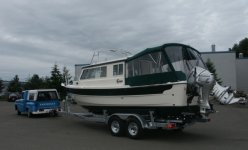DayBreak
Active member
- Joined
- Jul 16, 2017
- Messages
- 1,058
- Reaction score
- 12
- C Dory Year
- 2018
- C Dory Model
- 23 Venture
- Vessel Name
- DayBreak
I like Dave's tail wagging the dog comment. That is exactly how we described pulling our 23 Venture with our Dodge Dakota with a V-8 engine. Plenty of power for pulling but I felt very nervous and actually afraid to drive over the mountain pass to the coast while towing. I could feel the boat push the back of the truck from side to side while making turns and braking. Both units weighed equally at about 5000 lbs. Hated to sell the Dakota which we bought before buying the Venture but had to do so and bought a full sized truck with a 9200 lb.tow rating to tow the Venture. Now I find myself driving too fast at times and need to concentrate on slowing down for safety. Big difference in towing now. We feel much safer towing with a larger and more capable vehicle.
I also agree with Harald to have that extra margin of towing capacity by 3000 lbs or so.
I also agree with Harald to have that extra margin of towing capacity by 3000 lbs or so.

